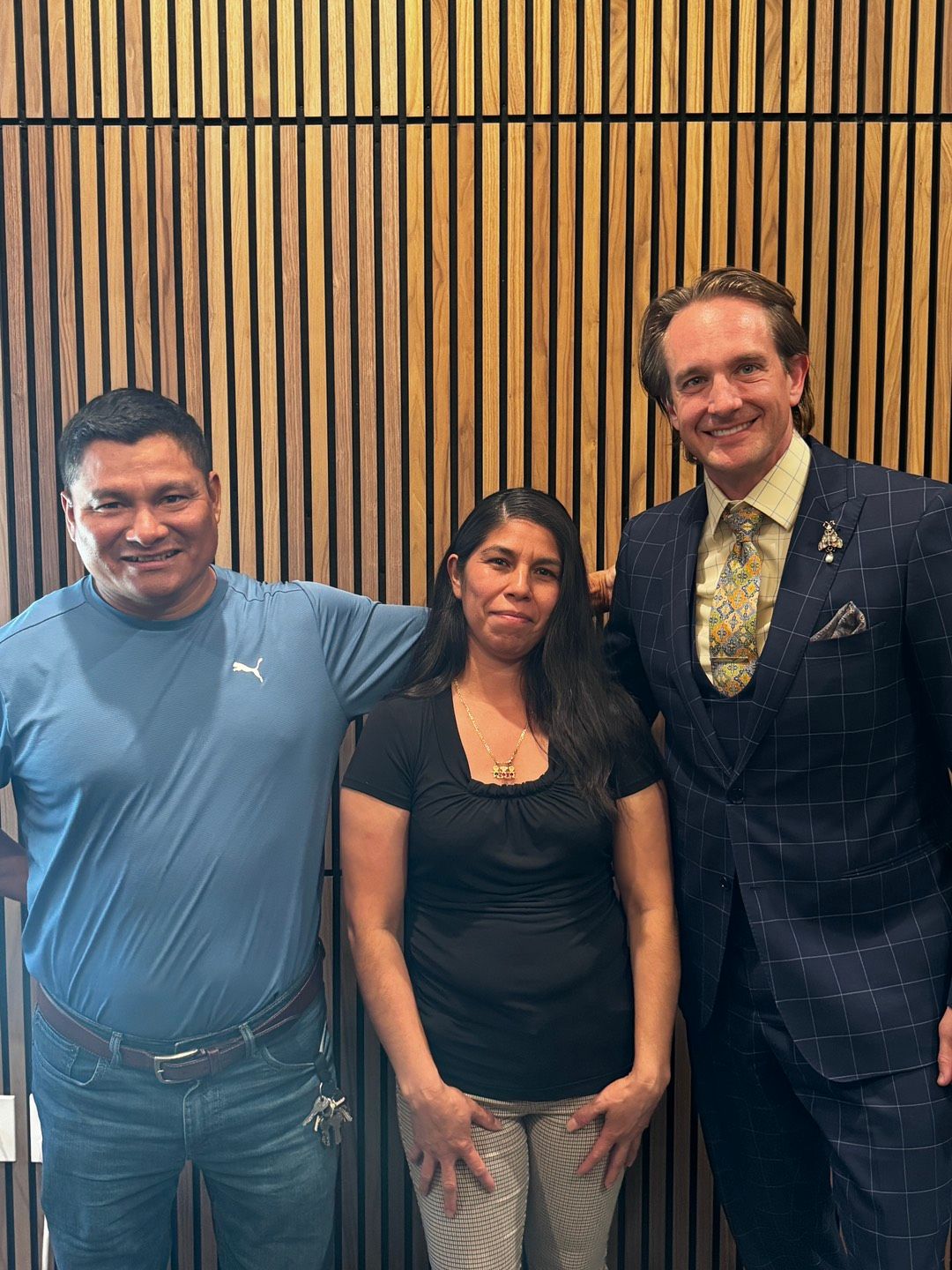Client Communication & Case Management Update
We are honored to represent you, and we take your case seriously.
To protect your case and to safeguard our team’s ability to advocate effectively, we are reinforcing key systems and boundaries during this period of overwhelming demand.
Please read carefully.
These updates reflect current law, court trends, and operational realities. They are designed to keep you informed, prepared, and supported.
Reminder: Staying Connected the Right Way
This information was shared upon initiation of your case (welcome); however, we are repeating it here because consistency and clarity are essential, especially during high-demand periods.
We send automated text alerts for case updates, appointment reminders, and urgent announcements. Your secure client portal remains active for document uploads, status checks, and direct communication.
These systems allow us to stay connected while focusing our limited resources on what matters most: the legal fight for your loved ones. Without them, we’d be forced to turn people away—and we refuse to let that happen. Boundaries protect our ability to keep showing up.
What You Can Expect
- Text alerts notify you of deadlines, appointments, and urgent updates.
- Client portal access allows you to upload documents, view case status, and send secure messages.
What to Avoid
- Do not rely on phone calls or walk-ins. These are reserved for emergencies or scheduled appointments.
- Do not block or ignore text alerts. You may miss critical deadlines or opportunities to protect your loved one.
- Do not send repeated messages. If you haven’t received portal access or alerts, contact our office once. Repeated outreach causes delays for everyone.
We know this is a difficult time. These systems are designed to support you, and to ensure we can continue fighting for every family who needs us.
⚠️ What We’re Facing
We are witnessing unprecedented and gruesome acts by the government—mass detentions, coercive tactics, and legislation designed to pressure families into accepting removal. We are in this fight with you. But we are a small team of four legal professionals (About US), plus Attorney Daniel Lippmann, and every moment spent on repeated calls or non-urgent messages takes time away from the filings, motions, and advocacy that could save someone’s life.
The entire immigration legal field is inundated. Law firms across the country are experiencing record-high demand, with detention populations now exceeding 56,000 daily. This work requires a skill set not many possess—and we are doing everything we can to help those we can. The alternative is turning people in need away.
Changes are happening daily. We make every effort to stay on top of new laws, policies, and court decisions—and to adjust our strategy accordingly. This means timelines may shift, priorities may change, and urgent action may be required with little notice.
⚠️ Immigration Removal Defense: What You Should Know
- EOIR-43: Stay of Bond ICE may file Form EOIR-43 to automatically stay a judge’s bond decision, keeping your loved one detained while ICE appeals. This tactic delays release even after a favorable ruling.
- Civil Actions Pending: Federal lawsuits are underway challenging EOIR-43—especially in cases involving individuals who entered without inspection (EWIs). Plaintiffs argue that automatic stays violate due process and undermine judicial authority.
- New Civil Penalty Rule (June 2025): ICE and EOIR now impose monetary penalties on individuals who fail to depart voluntarily or are apprehended while entering unlawfully. Appeals of these penalties now go directly to DHS, not immigration court.
- Laken Riley Act (2025): This new law expands mandatory detention and limits ICE’s discretion to release individuals, even those with no violent history. It increases the risk of prolonged detention for many.
- Transfers Outside Jurisdiction: ICE has broad discretion to move individuals to detention centers outside Nevada, often far from their families, attorneys, or pending court proceedings. If transferred, your case may be reassigned to a new immigration court. Because the immigration court is federal, we can continue to represent the client remotely, but transfers often cause delays. Our only legal mechanism to challenge a transfer is through an emergency federal writ, filed in U.S. District Court. This option is rare, time-sensitive, and will be explained if it becomes applicable to your case. We will notify you if any legal action is possible.
- Constitutional Pushback: Federal courts are beginning to challenge ICE’s use of military-style raids and racial profiling under the Fourth Amendment. Courts are also scrutinizing the use of expedited removal under section 235(b), especially for EWIs and those subject to EOIR-43, citing potential violations of due process and access to counsel.
⚖️Family-Based Immigration Clients - What You Need to Know
You have retained our office to handle your family-based immigration process—whether it’s a petition, adjustment of status, or consular filing. Now is not the time for missteps.
Any error, delay, or denial can trigger removal proceedings or result in long-term visa ineligibility. Visa denials—especially those based on fraud, misrepresentation, or prior immigration violations—can lead to permanent bars from reentry and may require complex legal waivers.
We want to see you succeed—and to help bring your family together. Whether your loved one is already in the U.S. or waiting abroad, our goal is to guide you through this process with clarity, care, and precision. That means following instructions, staying organized, and avoiding risky decisions that could jeopardize your case.
- Each team member is assigned to specific case types and monitors your progress once you’ve retained our office.
- Our standard preparation window is 90 days from the date we receive all required documents. Some cases may move faster; complex matters may take longer. This timeline is explained during intake and reflected in your onboarding materials.
- Delays in submitting requested documents—or providing incomplete or inconsistent information—will delay your case. Multiple follow-ups slow down preparation. We cannot move forward until your file is complete and accurate. Your responsiveness and attention to detail directly affect how quickly and efficiently we can prepare and file your application.
Please note: This administration has allocated significant funding to immigration enforcement and removal operations. As a result, divisions such as USCIS and U.S. Consular Posts (embassies) may experience delays in case processing. These delays are, unfortunately, beyond our control and stem from policy decisions made at the federal level.
We remain committed to monitoring all cases while pending, and we encourage you to contact us immediately if you receive any government updates, notices, or correspondence. Timely communication helps us protect your case and respond appropriately.
Nothing is done overnight. Your active participation—responding to texts, using the portal, and following instructions—is essential to moving your case forward. We are committed to your success, but we need your full cooperation to get there.
Our Commitment in a Broken System
The One Big Beautiful Bill Act, signed into law in July 2025, allocated an unprecedented amount of funding to immigration enforcement and removal operations. Here's a breakdown of the key figures:
Enforcement & Removal Funding Highlights
ICE Detention Expansion - $45 billion;
Purpose: Build new ICE facilities and double detention capacity
Deportation Operations - $15 billion;
Purpose: Increase deportation flights, personnel, and logistics
ICE Personnel & Infrastructure - $30 billion;
Purpose: Bonus pay, recruitment, training, vehicles, and enforcement tools
DHS Slush Funds (Enforcement Use) - $12.1 billion;
Flexible funds for DHS, much of which may be directed to ICE
This brings the total enforcement-related funding to over $100 billion, with ICE’s budget alone tripling compared to previous years. The administration expects this surge to result in:
- A 50% increase in ICE personnel
- A 100% expansion in detention capacity
- A 268% increase in removals by 2029
⚠️ What This Means for Clients
This massive investment in enforcement has already begun to strain the processing capacity of USCIS and U.S. Consular Posts. While enforcement operations are being supercharged, case adjudication and visa processing are facing delays, a direct consequence of federal priorities.
We do not agree with the priorities of this administration, especially the decision to invest billions in detention and deportation while families wait years for reunification. But we remain steadfast in our mission: to advocate, to prepare, and to protect.
Our commitment is to you, not to the politics. We will continue to monitor every case, respond to every update, and fight for every opportunity to move your process forward.
Justice may be delayed, but it is not abandoned. We’re with you—every step of the way.
Source: H.R.1 - 119th Congress (2025-2026): One Big Beautiful Bill Act | Congress.gov | Library of Congress; TITLE IX--COMMITTEE ON HOMELAND SECURITY AND GOVERNMENTAL AFFAIRS
⚠️ Out of Custody - In Removal or
With a Pending Immigration Process
Your freedom is a privilege—and a responsibility. If you are out of custody but still in removal proceedings or have a pending immigration case, it is absolutely critical that you avoid any legal trouble. Arrests of any kind—even for minor offenses—can severely impact your case and may result in detention or removal.
- Stay out of trouble. Avoid any situation that could lead to police contact, citations, or criminal charges. Your caution and cooperation are essential. We are doing everything we can to protect your case—but we need you to protect yourself too.
- Be prepared. Keep our office card with you at all times in case of an emergency, and make sure your loved ones have our contact information. If you are detained or face unexpected legal trouble, this can help ensure we are notified quickly and can respond appropriately.
- Pending cases: We are actively monitoring your case. If we haven’t contacted you, it means there is no action required from you at this time. Immigration cases often involve long waiting periods, and not every phase requires immediate updates or filings.
Please do not flood our office with updates unless instructed. We are managing high volumes and will initiate contact when your case requires it. In the meantime, keep your contact information updated and check your portal for any new messages or document requests.
What We Ask of You
- Use text and the client portal—these are the fastest ways to stay informed.
- Do not call or message repeatedly—this delays help for everyone.
- Allow 1-2 business days for non-urgent responses.
- Make sure your contact information is current.
- Please be prepared when we contact you—have documents ready, follow instructions carefully, and respond promptly.
💛 Patience & Purpose — Everyone Matters
We know the waiting is hard. The fear is real. And the stakes feel unbearable. But we ask you to remember:
You matter. Your loved ones matters. Every case matters.
We are not choosing one person over another. We are triaging based on urgency, risk, and legal opportunity, so that no one is forgotten, and no one is rushed into failure.
Please be patient. Please trust that we are working quietly, urgently, and relentlessly on behalf of every client we’ve committed to.
Your case is not just paperwork. It’s a life. And we treat it that way.







